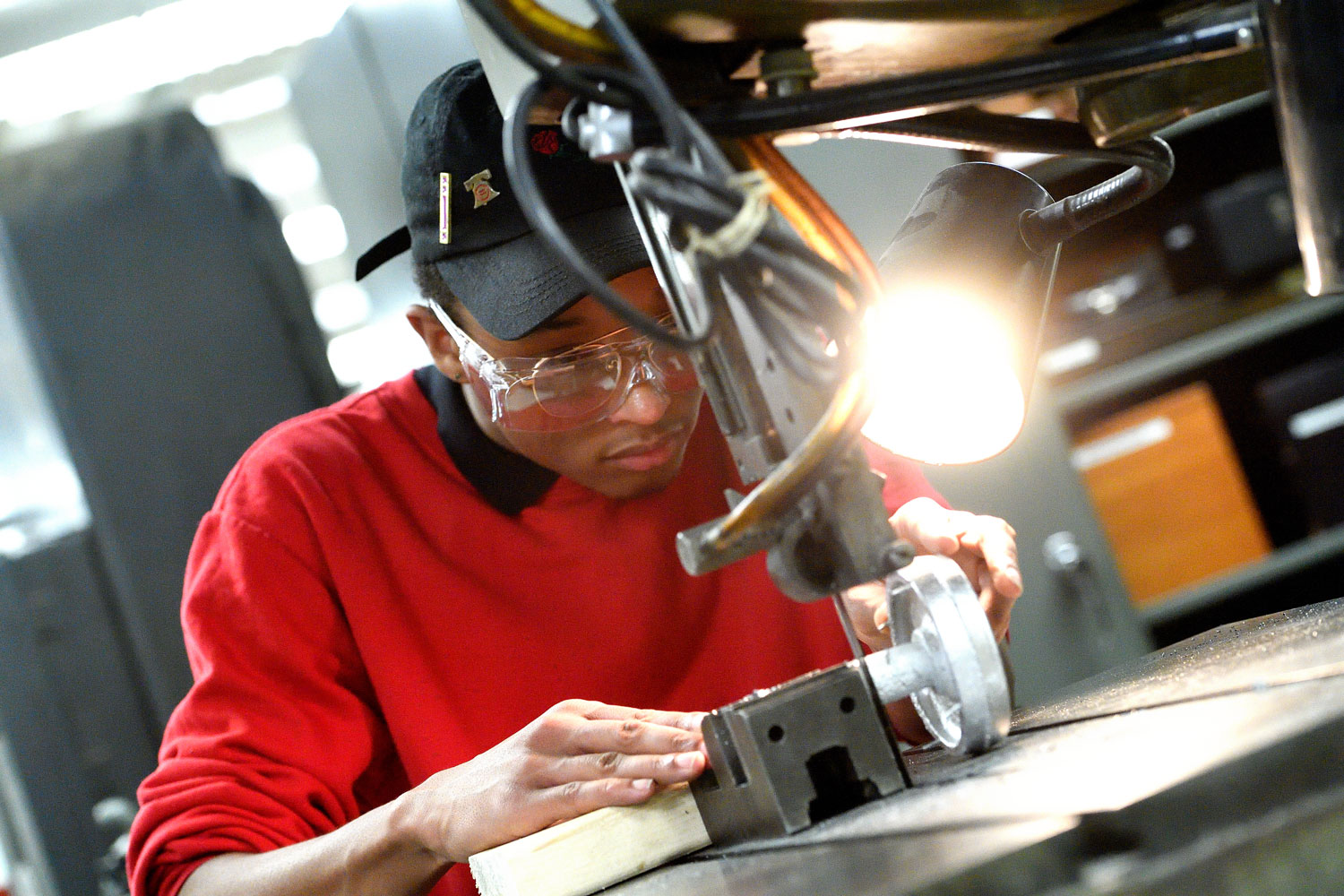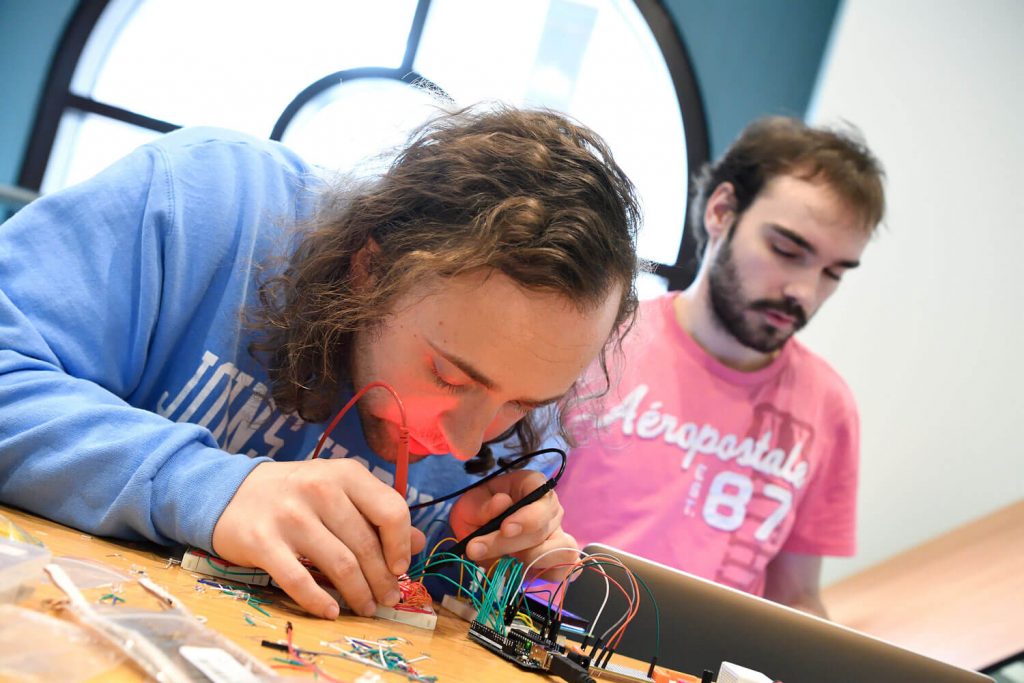Engineering Options

Engineering Options at Hopkins
Hopkins undergraduates have access to world-renowned faculty and resources designed for collaboration across disciplines. Many classes are also cross-registered between departments and schools, facilitating a truly interdisciplinary learning environment.
You can choose from a variety of programs to do groundbreaking research and solve real-life problems. Below are some options to connect your engineering and natural science interests with related fields like medicine and biotechnology.
SUPPORT FOR OUR STUDENTS

Whiting School of Engineering Academic Advising
Engineering Advising is here to ensure you have access to the support, resources, and information you need to make the most of your academic career.
Learn More About Whiting’s Academic Advising
Student Initiatives Fund
The Student Initiatives fund is designed to reward ingenuity and increase opportunities for students to expand their creative horizons.
Learn More About Student Initiatives Fund
Engineering Student Organizations
Participating in these groups is a great way to meet new people, learn more about your major, make professional connections, and have fun!
Learn More About Engineering Student OrganizationsBioengineering
Chemical and Biomolecular Engineering
The chemical and biomolecular engineering major is dedicated to the essential chemical and biomolecular engineering paradigms of transport, kinetics, and thermodynamics essential to solving complex engineering problems.
You can pursue one of two concentrations:
- Interfaces and nanotechnology: If you’re interested in nanomaterials, surface science, self-assembly, and applications of these subjects.
- Molecular and cellular bioengineering: If you’re interested in molecular and cellular events in biological systems and their applications.
Biomaterials
An interdisciplinary field at the intersection of materials science, engineering, biology, and medicine, biomaterials engineering is a track within the materials science and engineering major. Biomaterials engineers develop materials used in applications such as tissue engineering, drug and gene delivery, and medical implants and devices.
Biomechanics
Biomechanics is a concentration offered within the mechanical engineering and engineering mechanics majors. It offers a flexible experience that can be tailored to your interests.
At the macroscopic level, the biomechanics of soft and hard tissues play important roles in computer-integrated surgical systems and technologies, such as medical robotics.
At the cellular level, issues such as cell motility and chemotaxis can be modeled as mechanical phenomena.
At the subcellular level, conformational transitions in biological macromolecules can be modeled using molecular dynamics simulation, statistical mechanics, or techniques that rely on principles from the mechanics of materials.
Biotechnology
Computer Engineering
Airbag systems in automobiles, biomedical sensors that automatically administer medication, computer-controlled flight management systems in aircraft, speech recognition systems—these are just a few of the transformative technologies that involve computer engineering. Our program emphasizes hands-on laboratory experience to complement more theoretical courses.
Computer Science
Computer science is an evolving field which consists not only of fascinating problems and fundamental techniques, but also impacts many other disciplines. You’ll have the flexibility to choose from a Bachelor of Science (BS) degree and a Bachelor of Arts (BA) degree. Both programs build a balanced foundation in computer science, but also allow you to specialize in your junior and senior years. Concentrations within the department include computer security, natural language processing, computer systems, computer games, software engineering and robotics.
Life Sciences
Biology
Our biology department is home to 27 research laboratories investigating a wide range of biological problems with the goal of obtaining explanations in quantitative and molecular detail. The program will guide you as you develop a detailed, nuanced view of biology, integrating knowledge at the molecular, cellular, and organismal levels. Many of our undergrads also participate in research at the School of Medicine.
Biophysics
Biophysics is the application of the analytical viewpoints, methods, and/or instrumentation of physics to the investigation of biological problems. Building on core courses in mathematics, chemistry, physics, and biology, the discipline covers areas such as molecular structure and energetics, motility, protein folding, and membrane structure and assembly. The biophysics major meets all the requirements for medical school and prepares you for graduate school and research positions in many different areas after graduation.
Environmental Engineering
Environmental engineering is a highly interdisciplinary field focused on the study and amelioration of Earth’s complex and multifaceted environmental problems. You’ll gain a strong foundation in the physical, chemical, biological, and social sciences, as well as in mathematics, engineering science, and engineering design. This broad and flexible training provides ideal preparation to work in business or industry or go to grad school in environmental engineering or in a field such as environmental law, public health, or medicine.